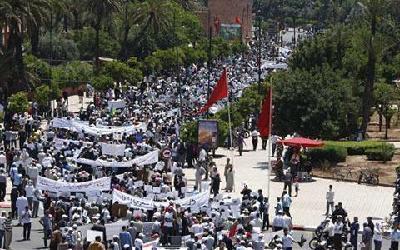
This is the VOA Special English Economics Report.
The "Arab Spring" in the Middle East and North Africa has raised hopes and dreams. But can it raise money to invest in a better future?
How to respond to the Arab uprisings was a major question for world leaders this week at the Group of Eight meeting in France. Earlier in the week, the head of the World Bank said international support can speed progress -- "but only if coupled with real reform."
World Bank President Robert Zoellick offered loans to Egypt and Tunisia. Tunisians and Egyptians led democracy protests that overthrew their presidents early this year.
President Obama discussed American development plans in his Middle East policy speech last week at the State Department.
BARACK OBAMA: "The goal must be a model in which protectionism gives way to openness, the reins of commerce pass from the few to the many and the economy generates jobs for the young. America's support for democracy will therefore be based on ensuring financial stability, promoting reform and integrating competitive markets with each other and the global economy. And we are going to start with Tunisia and Egypt."
The World Bank will offer Egypt 4.5 billion dollars in loans over the next two years. The money would be part of a plan with the International Monetary Fund to help control Egypt's budget deficit.
The goal is to improve the country's credit rating in order to ease the concerns of investors and reduce borrowing costs. About two billion dollars in loans would be linked to progress in government reforms.
The World Bank also promised at least one billion dollars for Tunisia.
Twenty years ago, the European Bank of Reconstruction and Development was created to help former communist countries after the fall of the Soviet Union. Now, that bank could invest up to 3.5 billion dollars in the Middle East and North Africa.
About 400 million people live in those two areas. A majority are under the age of 30. The anger of the many educated but unemployed young people has been a driving force in the Arab Spring movement.
Oil is the main export for many of the countries. Yet a recent World Bank study showed that oil has not done much to raise wages. Income growth continues to fall behind East Asia and South America.
Over the years, private investment has been limited largely to the oil industry. But there are some efforts to change that. In March, Secretary of State Hillary Clinton promised two billion dollars through a government agency known as OPIC.
OPIC is the Overseas Private Investment Corporation. It works with Americans businesses to invest in projects in developing countries.
And that's the VOA Special English Economics Report, written by Mario Ritter. I'm Steve Ember.
Senior Palestinian predicts violence if statehood blocked at UN
Social media, emerging street opposition are forces behind Syrian uprising
Inspired by Arab protests, Spain's unemployed rally for change
Obama, Jordan's King discuss mideast developments
(来源:VOA 编辑:崔旭燕)
